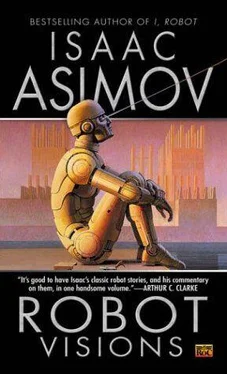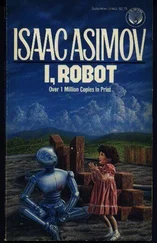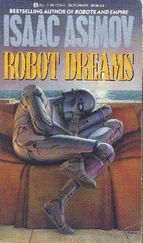Isaac Asimov - Robot Visions
Здесь есть возможность читать онлайн «Isaac Asimov - Robot Visions» весь текст электронной книги совершенно бесплатно (целиком полную версию без сокращений). В некоторых случаях можно слушать аудио, скачать через торрент в формате fb2 и присутствует краткое содержание. Жанр: Фантастика и фэнтези, на английском языке. Описание произведения, (предисловие) а так же отзывы посетителей доступны на портале библиотеки ЛибКат.
- Название:Robot Visions
- Автор:
- Жанр:
- Год:неизвестен
- ISBN:нет данных
- Рейтинг книги:5 / 5. Голосов: 1
-
Избранное:Добавить в избранное
- Отзывы:
-
Ваша оценка:
- 100
- 1
- 2
- 3
- 4
- 5
Robot Visions: краткое содержание, описание и аннотация
Предлагаем к чтению аннотацию, описание, краткое содержание или предисловие (зависит от того, что написал сам автор книги «Robot Visions»). Если вы не нашли необходимую информацию о книге — напишите в комментариях, мы постараемся отыскать её.
Robot Visions — читать онлайн бесплатно полную книгу (весь текст) целиком
Ниже представлен текст книги, разбитый по страницам. Система сохранения места последней прочитанной страницы, позволяет с удобством читать онлайн бесплатно книгу «Robot Visions», без необходимости каждый раз заново искать на чём Вы остановились. Поставьте закладку, и сможете в любой момент перейти на страницу, на которой закончили чтение.
Интервал:
Закладка:
Thus, when I decided to write a joke book, I did, and Houghton-Mifflin published it in 1971 under the title of Isaac Asimov’s Treasury of Humor. In it, I told 640 jokes that I happened to have as part of my memorized repertoire. (I also have enough for a sequel to be entitled Isaac Asimov Laughs Again, but I can’t seem to get around to writing it no matter how long I sit at the keyboard and how quickly I manipulate the keys.) I interspersed those jokes with my own theories concerning what is funny and how one makes what is funny even funnier.
Mind you, there are as many different theories of humor as there are people who write on the subject, and no two theories are alike. Some are, of course, much stupider than others, and I felt no embarrassment whatever in adding my own thoughts on the subject to the general mountain of commentary.
It is my feeling, to put it as succinctly as possible, that the one necessary ingredient in every successful joke is a sudden alteration in point of view. The more radical the alteration, the more suddenly it is demanded, the more quickly it is seen, the louder the laugh and the greater the joy.
Let me give you an example with a joke that is one of the few I made up myself:
Jim comes into a bar and finds his best friend, Bill, at a corner table gravely nursing a glass of beer and wearing a look of solemnity on his face. Jim sits down at the table and says sympathetically, “What’s the matter, Bill?”
Bill sighs, and says, “My wife ran off yesterday with my best friend.”
Jim says, in a shocked voice, “What are you talking about, Bill? I’m your best friend.”
To which Bin answers softly, “Not anymore.”
I trust you see the change in point of view. The natural supposition is that poor Bill is sunk in gloom over a tragic loss. It is only with the last three words that you realize, quite suddenly, that he is, in actual fact, delighted. And the average human male is sufficiently ambivalent about his wife (however beloved she might be) to greet this particular change in point of view with delight.
Now, if a robot is designed to have a brain that responds to logic only (and of what use would any other kind of robot brain be to humans who are hoping to employ robots for their own purposes?), a sudden change in point of view would be hard to achieve. It would imply that the rules of logic were wrong in the first place or were capable of a flexibility that they obviously don’t have. In addition, it would be dangerous to build ambivalence into a robot brain. What we want from him is decision and not the to-be-or-not-to-be of a Hamlet.
Imagine, then, telling a robot the joke I have just given you, and imagine the robot staring at you solemnly after you are done, and questioning you, thus.
Robot: “But why is Jim no longer Bill’s best friend? You have not described Jim as doing anything that would cause Bill to be angry with him or disappointed in him.”
You: “Well, no, it’s not that Jim has done anything. It’s that someone else has done something for Bill that was so wonderful, that he has been promoted over Jim’s head and has instantly become Bill’s new best friend.”
Robot: “But who has done this?” You: “The man who ran away with Bill’s wife, of course.” Robot (after a thoughtful pause): “But that can’t be so. Bill must have felt profound affection for his wife and a great sadness over her loss. Is that not how human males feel about their wives, and how they would react to their loss?”
You: “In theory, yes. However, it turns out that Bill strongly disliked his wife and was glad someone had run off with her.”
Robot (after another thoughtful pause): “But you did not say that was so.”
You: “I know. That’s what makes it funny. I led you in one direction and then suddenly let you know that was the wrong direction.”
Robot: “Is it funny to mislead a person?”
You (giving up): “Well, let’s get on with building this house.”
In fact, some jokes actually depend on the illogical responses of human beings. Consider this one:
The inveterate horse player paused before taking his place at the betting windows, and offered up a fervent prayer to his Maker.
“Blessed Lord,” he murmured with mountain-moving sincerity. “I know you don’t approve of my gambling, but just this once, Lord, just this once, please let me break even. I need the money so badly.”
If you were so foolish as to tell this joke to a robot, he would immediately say, “But to break even means that he would leave the races with precisely the amount of money he had when he entered. Isn’t that so?”
“Yes, that’s so.”
“Then, if he needs the money so badly, all he need do is not bet at all, and it would be just as though he had broken even.”
“Yes, but he has this unreasoning need to gamble.”
“You mean even if he loses.”
“Yes.”
“But that makes no sense.”
“But the point of the joke is that the gambler doesn’t understand this.”
“You mean it’s funny if a person lacks any sense of logic and is possessed of not even the simplest understanding?”
And what can you do but turn back to building the house again?
But tell me, is this so different from dealing with the ordinary humorless human being? I once told my father this joke:
Mrs. Jones, the landlady, woke up in the middle of the night because there were strange noises outside her door. She looked out, and there was Robinson, one of her boarders, forcing a frightened horse up the stairs.
She shrieked, “What are you doing, Mr. Robinson?”
He said, “Putting the horse in the bathroom.”
“For goodness sake, why?”
“Well, old Higginbotham is such a wise guy. Whatever I tell him, he answers, ‘I know. I know,’ in such a superior way. Well, in the morning, he’ll go to the bathroom and he’ll come out yelling, ‘There’s a horse in the bathroom.’ And I’ll yawn and say, ‘I know, I know.’ “
And what was my father’s response? He said, “Isaac, Isaac. You’re a city boy, so you don’t understand. You can’t push a horse up the stairs if he doesn’t want to go.”
Personally, I thought that was funnier than the joke.
Anyway, I don’t see why we should particularly want a robot to have a sense of humor, but the point is that the robot himself might want to have one-and how do we give it to him?
Robots In Combination
I have been inventing stories about robots now for very nearly half a century. In that time, I have rung almost every conceivable change upon the theme.
Mind you, it was not my intention to compose an encyclopedia of robot nuances; it was not even my intention to write about them for half a century. It just happened that I survived that long and maintained my interest in the concept. And it also just happened that in attempting to think of new story ideas involving robots, I ended up thinking about nearly everything.
For instance, in the sixth volume of the Robot City series, there are the “chemfets,” which have been introduced into the hero’s body in order to replicate and, eventually, give him direct psycho-electronic control over the core computer, and hence all the robots of Robot City.
Well, in my book Foundation’s Edge (Doubleday, 1982), my hero, Golan Trevize, before taking off in a spaceship, makes contact with an advanced computer by placing his hands on an indicated place on the desk before him.
“And as he and the computer held hands, their thinking merged…
“…he saw the room with complete clarity-not just in the direction in which he was looking, but all around and above and below.
“He saw every room in the spaceship, and he saw outside as well. The sun had risen…but he could look at it directly without being dazzled…
Читать дальшеИнтервал:
Закладка:
Похожие книги на «Robot Visions»
Представляем Вашему вниманию похожие книги на «Robot Visions» списком для выбора. Мы отобрали схожую по названию и смыслу литературу в надежде предоставить читателям больше вариантов отыскать новые, интересные, ещё непрочитанные произведения.
Обсуждение, отзывы о книге «Robot Visions» и просто собственные мнения читателей. Оставьте ваши комментарии, напишите, что Вы думаете о произведении, его смысле или главных героях. Укажите что конкретно понравилось, а что нет, и почему Вы так считаете.








